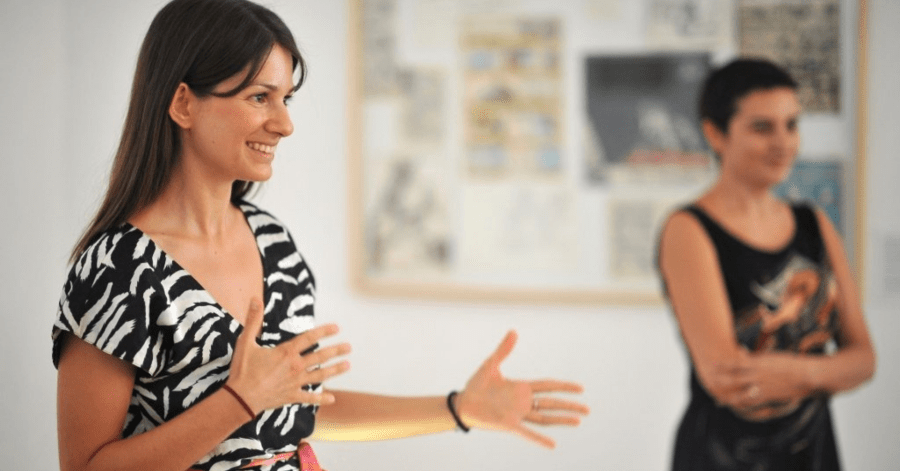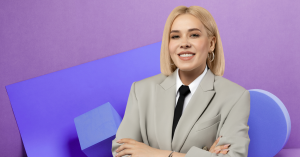Having just started a family, Stella Kasdagli had no idea what she could expect from her career going further. So, she did what most professionals do at a crossroads: she looked for a mentor. She looked and looked, hoping to talk to women with more experience than her for guidance. What emerged from this search was an acute realization of the lack of support women have in the labor market. This realization changed her career trajectory. Stella Kasdagli became determined to make sure that other women find the mentorship support they need. She founded Women On Top.
There is a well-studied connection between gender inequality and work. In the workplace, gender inequality takes many forms, from unequal pay, to disparity in promotions, and incidents of sexual harrassment. The causes are also well-documented. Gender stereotypes permeate all our social and economic activities, from how we reward and punish boys and girls, to what we expect of leadership. Job segregation, the unequal distribution of men and women across and within job types, a result of many factors, is another driver of gender disparities in the workplace.
It is on solutions for closing the gender gap that we will focus our attention today. There are concrete ways to reduce inequality in career advancement, and equal access to a mentoring network is one of them.
Greece-based Women On Top is a mentoring network through which any woman, from any professional field, experience level or geographic region, can find a mentor to support her in the challenges she faces in her professional life.
The organization also partners with companies to design and conduct gender impact assessments and inclusion plans for companies, coordinates research projects on multiple dimensions of gender equity, and draft policy recommendations around reducing gender inequality.
Founded by Stella Kasdagli and Galini Iliopoulou in 2012 and later joined by Penelope Theodorakakou, Women On Top has become the most experienced organization in Greece on the professional empowerment of women. In 2020, it became the first non-profit organization participating in the National Council for Gender Equality.
So far, more than 1500 women received mentorship from over 500 mentors, 2,300 women received training and learning opportunities, and 3300 executives received training on issues of gender equality in the workplace.
Today, we chat with co-founder Stella Kasdagli, a writer, translator and journalist, who found her mission in enabling the professional empowerment of women in tech and equality at work.
The Recursive: What inspired you to launch Women On Top and become an entrepreneur?
Stella Kasdagli: The idea for the creation of Women On Top came to me when I was around 30 years old. I was working in the media then, just had my first daughter, and I was in desperate need for some advice on what I could expect from my career going forward, how I could reach my goals, and even determine what those goals were. I was looking to find other women who had worked in the media and were more experienced than me, in order to learn from their experiences, but I didn’t really know how to find them, how to approach them, etc.
That’s when I thought that there should be a place where any woman could turn to find a suitable mentor for any of the challenges she was facing in her professional life.
And that is how Women On Top was born – first as a side project and then, when I left my day job to become a freelancer, a fully-fledged social enterprise for the economic empowerment of women and for the promotion of gender equity and inclusion in the workplace.
What are you most proud of from the achievements of Women On Top? What is the vision for the future?
I am most proud of the fact that we have helped normalize the discussion around gender equality in the workplace in Greece. When we were starting, very few people knew what mentoring was and even fewer thought that there would come a time when businesses and organizations would be willing to talk about gender equality and inclusion, implicit bias, sexual harassment, or how to combat the glass ceiling phenomenon. Well, this day has come and Women On Top has contributed in making this discussion possible, relevant and necessary.
What are the systemic issues that make progress on diversity so slow?
I think that the stereotypes surrounding our socially prescribed gender roles permeate all aspects of our private and public lives and are in the root of most discrimination that is happening against women – not just in Greece, but in almost every country in the world. There are similar stereotypes that create barriers for other underrepresented groups in our societies and this illustrates how hard it can be for us humans to realize that times are changing and that people do not only represent groups that share parts of their identities, but are complex and unique creatures that should be treated as such.
Addressing equality starts in schools. What are the most impactful things we could do differently in school to support gender equality?
I think the first step is to uncover all the ways in which discrimination happens in schools. We need to start seeing inequality in our school books, our school spaces, the way male and female teachers are treated, the way we reward and/or punish boys and girls in the classroom, the way men and women within the education system talk to one another and treat one another. Gender equality is not a course in a curriculum, it is an everyday practice that has to be embraced by each and everyone of us in order for things to change for the better.
During your experiences as a mentor and trainer, what did you learn about the key qualities of women and how we can channel and leverage these powers in the workplace?
I don’t think there are key qualities of women and men. There are key qualities of people who have been raised to believe x or y about their role in the world and I think this is where we need to turn if we want to see new and desirable qualities in all people, in the workplace and beyond. If lots of women have the ability to communicate effectively with a diverse range of stakeholders, it is not because they have some magic “feminine” quality, it is because they have learned the skill of taking into account the different needs of their family members, their friends etc. Can we teach this skill to more boys and men? Of course we can, if we change our perception of what boys and men must know how to do. And then we will be able to leverage this quality in a much more meaningful way, because then it will be a staple and a prerequisite for our leaders, male or female, in the workplace.
What did you want to be growing up and how has this vision changed over the years?
When I was little, I wanted to be a fisherwoman, a painter or a doctor. I still love working in peace, like a fisherwoman, being creative, like a painter, and being useful, like a doctor. That, for me, means that it is worth uncovering the real values behind our desires, because then we can achieve those values through a multitude of other paths.
Why did you decide to become an author? What would you say is the secret power of books?
I never decided to be an author, I just realized that writing gives me the peace and the time I need in order to better express my thoughts and feelings. If you keep doing that, then you may accidentally become an author.
What is your advice for aspiring women entrepreneurs everywhere?
To always remember that entrepreneurship is not a goal, it’s a journey. It never stops, which means that it is both exhilarating and exhausting and you need to be ready to embrace both.








